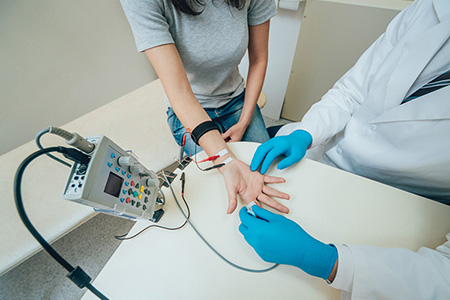 Nerve testing measures the electrical activity of your nerves. It may be ordered by your physician to diagnose or evaluate a suspected nerve injury. Let’s consider some indications that it may be time to discuss nerve testing with your doctor.
Nerve testing measures the electrical activity of your nerves. It may be ordered by your physician to diagnose or evaluate a suspected nerve injury. Let’s consider some indications that it may be time to discuss nerve testing with your doctor.
There are 2 types of nerves, sensory and motor nerves. Sensory nerves are responsible for sensations like heat, cold, sharp or dull pain. The sensory signals run from the tips of your fingers and toes to your spinal cord and then up into your brain. Motor nerves transmit signals in the opposite direction from the brain to your muscles.
Nerve testing generally involves measuring the speed at which a sensory nerve transmits a signal to your brain which is known as the nerve conduction velocity (NCV) test and a recording of the electrical activity in the muscles as a response to signals from the motor nerve which is known as electromyography (EMG).
During the NCV study, electrode patches are placed on your skin over the nerve to be tested. A small amount of electricity is dispensed through the electrodes. The velocity of the electrical signal flow is measured.
During the EMG study, a thin needle electrode is inserted into a specific muscle through the skin. The electrode records the electrical activity within the muscle during relaxation and contraction.
If you have back pain or neck pain that cannot be explained, or numbness or tingling sensation, muscle cramping, or weakness in your legs or arms; you should speak to your doctor about having nerve testing done. The tests will help identify if the problem lies within the muscles or nerves as well as the presence and cause of the nerve damage.
North Suffolk Neurology is a full-service Neurology, Headache Medicine, and Sleep Medicine practice consisting of dedicated, experienced staff committed to helping our patients and their families maintain and improve their health. For all in-office appointments & inquiries, please call (631) 364-9119. You can also schedule a telehealth appointment by calling (631) 886-4571.








